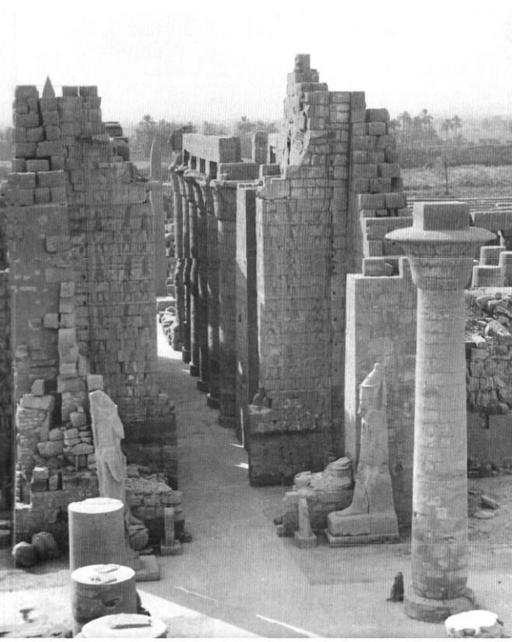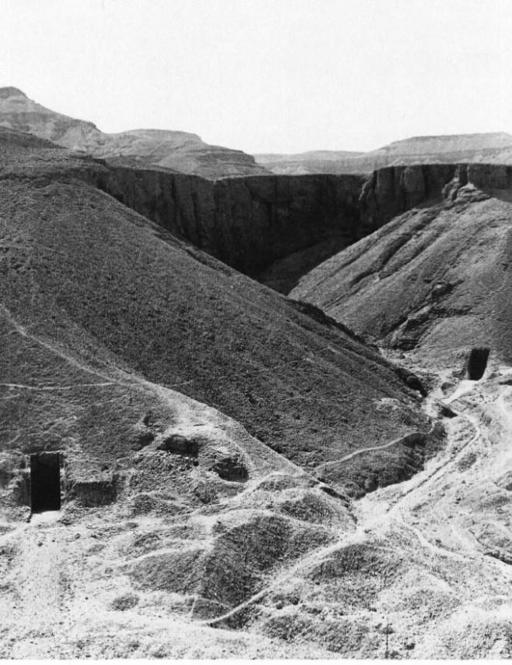Hatchepsut: The Female Pharaoh (40 page)
Read Hatchepsut: The Female Pharaoh Online
Authors: Joyce Tyldesley
Tags: #History, #Africa, #General, #World, #Ancient

Sharpe correctly credits Hatchepsut with building works at Karnak, the erection of a pair of obelisks and the construction of the Deir el-Bahri temple, but he also believed that she had built the third pyramid at Giza, misreading her name Maatkare and confusing her with both King Menkaure of the 4th Dynasty and Queen Menkare-Nitocris, the 6th Dynasty female ruler of Egypt whose story has become entangled with a host of myths and legends and whose beautiful naked ghost – this time confused with the fictional courtesan and queen, Rhodolphis – is said to haunt the pyramids.

A mere twenty-five years later, with a greater understanding of the hieroglyphic language, much of the confusion had been cleared away. Hatchepsut's name, titles and principal monuments were now known, and she even had her own entry in a dictionary of Egyptian archaeology published in 1875:
Hatsou… queen of the 18th Dynasty. Her
prenomen is Ra-ma-ka
[Maatkare read backwards]. Her father, Thouthmes I, proclaimed her queen in preference to her two brothers, who reigned later under the names of Thouthmes II and Thouthmes III. However she shared power with Thouthmes II, who died a short time after. Again Hatchepsut reigned alone… Next she associated herself with her second brother Thouthmes III, and it was not until the fifteenth year of his reign that she eventually decided to give up the throne. She is represented on the monuments as a king, with a bearded face.
31
From this time on it was the work of the archaeologists patiently excavating in and around Luxor and on the West Bank at Thebes which was to add factual flesh to the bare bones of Hatchepsut's history. Mariette, Naville, Carter, Winlock, Lancing, Hayes and the Polish Mission, to name but a few, have all made substantial contributions to our increasing understanding of her unusual reign, an understanding which is, through necessity, based almost entirely on Hatchepsut's own surviving monuments and monumental inscriptions – her own propaganda in stone. Hatchepsut had always intended that her monuments should be read as eternal testimonies to her own grandeur. It is perhaps only fitting that they should now, some three thousand years after their conception, start to slowly reveal the story of her rule as the king herself wished it to be told. Hatchepsut's mummified body may be lost to us but her name, temporarily forgotten but now forever linked with the beautiful
Djeser-Djeseru
, is once again spoken in Egypt.
Historical Events
Years Before Christ | LOCAL CHRONOLOGY | EGYPT |
3000 | Archaic Period (Dynasties 1–2) | Unification of Egypt |
2500 | Old Kingdom (Dynasties 3–6) | Djoser step-pyramid at Sakkara |
2000 | First Intermediate Period (Dynasties 7–11) | |
Middle Kingdom (Dynasties 11–13) | Theban kings re-unify Egypt | |
1500 | Second Intermediate Period (Dynasties 14–17) | Hyksos kings in Northern Egypt |
New Kingdom (Dynasties 18–20) | Hatchepsut | |
1000 | Third Intermediate Period (Dynasties 21–25) | Kings at Tanis |
500 | Late Period (Dynasties 26–31) | |
Ptolemaic Period | Egypt part of Roman Empire |

1. The Temple of Amen at Karnak.

2. The Valley of the Kings.

3. Hatchepsut as king offering before the barque of Amen.

4. The God Amen.

5. Seated statue of Hatchepsut from
Djeser-Djeseru
showing the king with a female body and male accessories.

6. The near-identical figures for King Hatchepsut and King Tuthmosis III, Hatchepsut in front.

7. Scene showing the gods crowning King Hatchepsut, which had been attacked in antiquity.

8. Head of Hatchepsut.

9. Granite statue of Hatchepsut.
